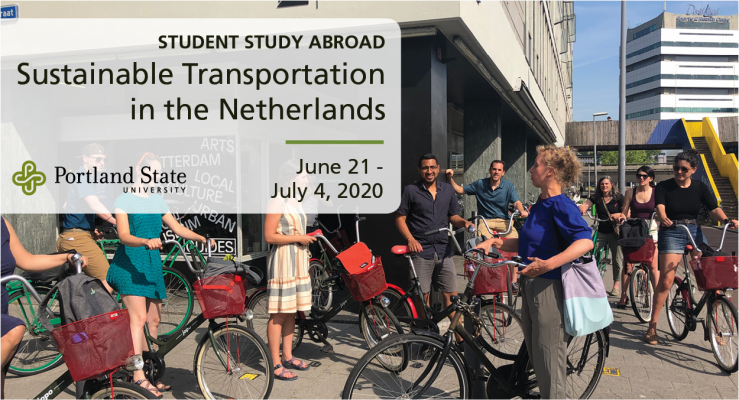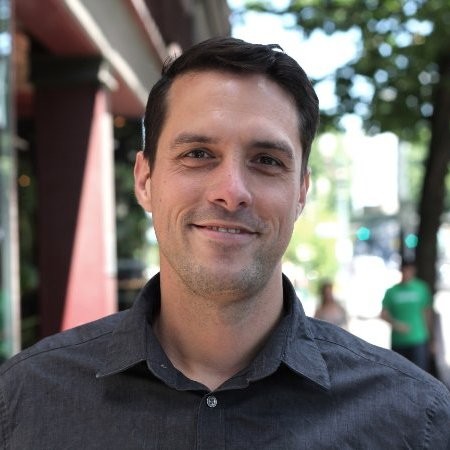
We remain committed to making decisions that promote the success and well-being of our communities, and support our community members in following taking steps to take care of themselves, minimize the spread of the COVID-19, and protect those who are the highest risk. Unfortunately, Student Study Abroad 2020: Sustainable Transportation in the Netherlands has been cancelled for 2020 in order to serve these ends. We intend to offer the course again next year. Fill out this interest form if you would like us to notify you when study abroad applications open for 2021.
This four-credit (CE 495 / 595) Portland State University course creates an immersive experience to explore the Dutch approach to cycling, transit, innovative mobility and land use. The curriculum will feature material that provides a comparison between U.S. and the Netherlands problems, priorities, and solutions. Specific emphases on planning and engineering principles, policy, and practice will be explored through field trips, tours and guest lectures, while visiting Utrecht, Amsterdam, Delft, and Houten. Students completing this course will develop a broader understanding of sustainable transportation issues and expand their toolkit for context-sensitive solutions. This study abroad program will examines how the urban areas and transportation systems of that nation have been designed to promote transportation by foot, bicycle, and public transportation. You'll learn:
- Design of bikeways, safe pedestrian crossings, and transit systems;
- Urban expansion and land-use policies to promote travel by foot, bike, and public transport;
- Smart cities programs and projects;
- Roadway system design for safety and to prevent roads from becoming barriers to walking and cycling;
- and design for transit priority on roadways and for high-quality rail, tram, and bus service.
- No previous language study required.
APPLY TO THE PROGRAM BY MARCH 1, 2020
Through design projects, offers students an opportunity to apply lessons learned to the U.S. context. Come rent your fiets and experience some of the best biking infrastructure in the world! We've been hosting this university student course for several years. See photos from the 2019 course, 2016 course and 2015 course.
DAY BY DAY AGENDA (June 21 - July 4, 2020)
The daily itineray is subject to change.
| MORNING | AFTERNOON | ||
| Sunday, June 21 | Arrive in Utrecht | Welcome Dinner | |
| Monday, June 22 | Morning Activity: Get bikes! Orientation & bike safety. | Take a tour of the city and watch welcome presentations from the instructors. | |
| Tuesday, June 23 | Lecture: Urban Transportation in the Netherlands—Biking, Bike Infrastructure, and Policy | Bike Tour (featuring bike parking, car-free zones in the center city, road diets, rails to trails, and a new bridge) Bike Tour (featuring case studies of retrofit projects to accommodate more cyclists, and problem intersections) | |
| Wednesday, June 24 | Bike Tour: Rotterdam (featuring bike infrastructure and programs) | ||
| Thursday, June 25 | Bike Tour: Houten (featuring Vision Zero, bike infrastructure and unique land use) | ||
| Friday, June 26 | Bike Tour: Amsterdam (featuring transit facilities) | ||
| Saturday, June 27 | Bike Tour (Optional): The Hovenring (a suspended cycle path roundabout between the localities of Eindhoven, Veldhoven, and Meerhoven) | ||
| Sunday, June 28 | Day Off | ||
| Monday, June 29 | Lecture at University of Applied Sciences Utrecht on Land Use Planning, Sustainable Development and other topics | Work on design projects | |
| Tuesday, June 30 | Tour: Delft | ||
| Wednesday, July 1 | Lecture at University of Applied Sciences Utrecht on Pedestrian Planning | Work on design projects | |
| Thursday, July 2 | Tour: Amsterdam (featuring Smart Cities and New Mobility) | ||
| Friday, July 3 | Present design projects | Farewell Dinner | |
| Saturday, July 4 | Departures | ||
WHO SHOULD ATTEND
This two-week program is open to college seniors and graduate students from any university, as well as professionals. Capacity is limited to 15 participants, so apply early! Students studying transportation engineering, urban planning, transportation program development, aspiring policymakers, and anyone interested in nurturing cycling in their communities are welcome to apply.
If you're a professional looking for a shorter program, we are offering a one-week option here.
ATTEND AN INFORMATION SESSION
Watch a recording of an info session that was held on January 28, 2020. Contact us at asktrec@pdx.edu if you have any questions.
APPLY FOR THE COURSE
Applications are now open! Requests for reasonable accommodations are made through the application process.
- PSU Students: Students will need to complete the online application ($50 application fee)
- Non-PSU Students and Professionals: You will need to complete the same application process as PSU students. Once accepted, you will need to enroll as a non-degree seeking student at PSU (additional $25 non-degree student fee).
ESTIMATED COST
PROGRAM FEE INCLUDES:
- 4 credits (CE 495/595)
- Housing in a centrally located hostel
- Bike rental in Utrecht, Amsterdam, Rotterdam, and Delft
- Round trip train tickets for day field tours to:
- Amsterdam
- Rotterdam
- Delft
- One day Amsterdam public transportation pass
- Two guest lectures by local experts on the following topics: Smart Cities expert session on "Smart Mobility", Transportation Planning and Bike Infrastructure in Rotterdam
- Transit Infrastructure tour of Amsterdam (including the main rail and transit station)
- Day trip to Rotterdam: a major port city known for its ship history and modern architecture
- Education Abroad service fee
- International Health Insurance
- 24/7 on-site support
ADDITIONAL ESTIMATED COSTS INCLUDE:
- International round-trip airfare
- Transportation from airport to/from hotel
- Additional meals
- Personal spending money
- Passport or visa (US passport holders will not need a visa to participate in this program)
Are you a PSU student looking for financial aid to take this course? See the PSU Education Abroad Scholarship Resources page for more information.
INSTRUCTORS
 Nick Falbo
Nick FalboNick Falbo is an urban planner and designer specializing in bicycle and pedestrian transportation. He has a personal interest in visual communication for planning, as a way to tell stories, communicate new ideas, and open minds. He is also the creator of the Protected Intersections for Bicyclists video proposal for adapting Dutch intersection designs to US streets. Nick works for the City of Portland Bureau of Transportation as a Senior Transportation Planner. Prior to this, he worked as a planner for Alta Planning + Design. He is also a contributing instructor to the Initiative for Bicycle and Pedestrian Innovation (IBPI)'s bikeway design workshops.
John MacArthur currently manages a complex Federal Transit Administration (FTA) grant to Develop and Test an Emergency Transportation Recovery Plan for the Portland, Oregon Region. This project requires close coordination and collaboration with a variety of public agency partners including city of Portland emergency management and transportation bureaus in addition to transit and other agencies critical to the region’s emergency transportation recovery efforts. MacArthur is the Principal Investigator for TREC's electric bicycle research initiatives. His research also includes low-/no-emission vehicle infrastructure in Portland metro, as well as a climate change impact assessment for surface transportation in the Pacific Northwest and Alaska.
WITHDRAWAL AND REFUND POLICY
(Non-refundable fees: $50 app fee + $250 Ed Abroad fee)
Students may officially withdraw from a program by providing written notification of their withdrawal to the Education Abroad Advisor in the PSU Education Abroad Office. Students are not considered withdrawn from a program until written notification is received. Withdrawing from a program does not, however, absolve you of your responsibility of covering program costs. If the student withdraws from a program after they have changed their online application status to “committed” they will be billed the non-refundable fees, as stated above, as well as any non-recoverable program costs, as determined by each program refund policy.
FREQUENTLY ASKED QUESTIONS
Will there be a visit to TU Delft (Delft University of Technology)?
The trip will most likely visit there. If for some reason we are unable to, it would be possible to schedule a visit after our day's sessions.
What work will students be expected to complete?
It is a four credit class, and so taking notes, reflecting, sketching, and daily summarizes are expected on the trip. A long term project will also be assigned. This would include at least three options from a variety of disciplines. Past topic examples include: analyzing U.S. challenges in urban design and applying a dutch strategy, analyzing Portland Intersections, answering policy land use questions, and urban development.
Are laptops required?
No.
What has been the size of past groups?
The groups have been about 12 students in size and the program caps at 15 students. Students are generally from urban planning or engineering backgrounds. All majors and fields of studies are encouraged to apply. Geographically most students come from Oregon with some from California, Washington, and Canada.
Do the Dutch speak English?
Yes, school there is taught in Dutch and English.
Why is a recommendation required for my application?
The recommendation (from a faculty member or professional reference) helps us determine if you're academically ready for an immersive education experience abroad. It's not a letter, but rather a fairly quick form that your reference can complete in 10 - 15 minutes. The bulk of the electronic recommendation are drop-down ratings to confirm qualities like "reliability", "adaptability", "motivation" - plus one or two open-ended questions.

The Transportation Research and Education Center (TREC) at Portland State University is home to the National Institute for Transportation and Communities (NITC), the Initiative for Bicycle and Pedestrian Innovation (IBPI), and other transportation programs. TREC produces research and tools for transportation decision makers, develops K-12 curriculum to expand the diversity and capacity of the workforce, and engages students and professionals through education.
